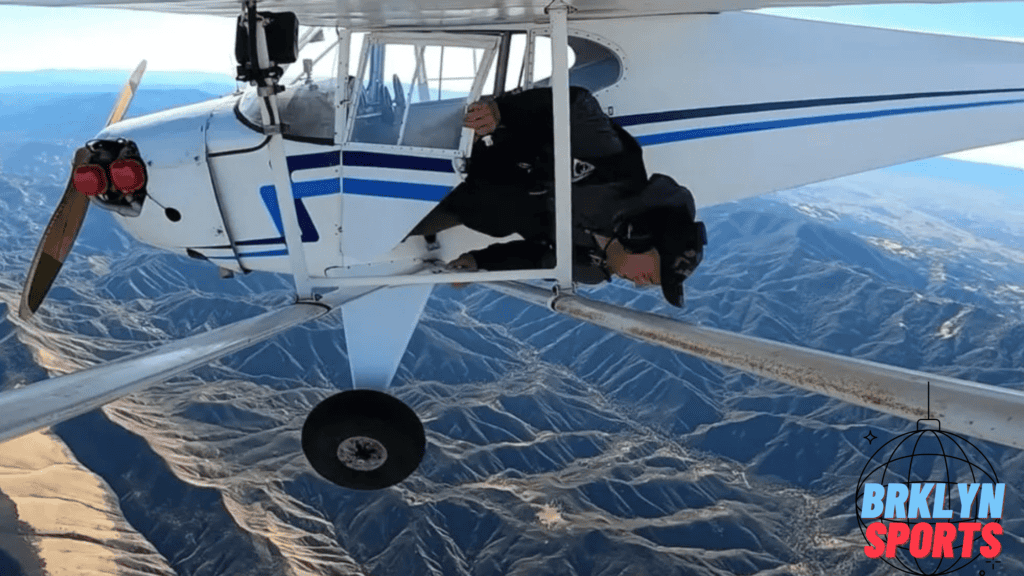Trevor Jacob: The Story Behind the Infamous Plane Crash Stunt
(BRKLYN SPORTS)– In November 2021, an unusual and controversial event rocked the aviation world and the online community. A YouTuber and Former Olympic athlete was given a six-month sentence, Trevor Jacob made headlines when he purposefully crashed his Taylorcraft BL-65 airplane. What followed was a whirlwind of media coverage, legal battles, and heated debates about ethics and responsibility in content creation.
Table of Contents
The Flight That Started It All
Jacob’s flight began at Lompoc Airport in California. He claimed to be bound for Mammoth Lakes, a scenic destination in the Sierra Nevada mountains. However, just 35 minutes into his journey, the narrative took an unexpected turn.
The Unfolding of the Incident
During the flight, Jacob jumped out of the airplane while flying over a dense forest. Equipped with a parachute and several cameras, he meticulously documented his freefall and subsequent landing. The plane, left to its own devices, descended into the wilderness, crashing in dramatic fashion.
The Crash Filmed from All Angles
Jacob’s Taylorcraft BL-65 was equipped with multiple cameras, strategically placed to capture every angle of the crash. From the wing to the tail, these devices provided an up-close view of the aircraft’s demise, leaving little to the imagination. Nobody knew that the YouTuber and Former Olympic athlete was given a six-month sentence in federal prison until he posted a video on YouTube.
Post-Crash Actions
After landing safely, Jacob visited the crash site to recover footage from the onboard cameras. This step was crucial in piecing together the video that would later spark controversy.
The YouTube Video: “I Crashed My Airplane”
On December 23, 2021, Jacob uploaded a video titled “I Crashed My Airplane” to YouTube. The video, which showcased the crash footage, was more than just a personal adventure. It was a marketing strategy tied to a sponsorship deal with a wallet brand.
The Legal Fallout
Trevor Jacob and the FAA
The Federal Aviation Administration (FAA) swiftly responded to the incident, revoking Jacob’s pilot license. The organization cited multiple violations of aviation regulations, emphasizing the need for accountability.
Federal Investigation and Sentencing
Federal prosecutors accused Jacob of orchestrating the crash for financial gain. In an official statement, he admitted to deliberately downing his plane. His actions led to a series of legal proceedings and eventual sentencing.
Public Reaction
The video drew millions of views and sparked widespread debate. While some admired the daring stunt, others criticized it as reckless and unethical. Aviation enthusiasts, in particular, voiced concerns about the potential risks to public safety.
Marketing at Any Cost?
Jacob’s crash highlighted the darker side of influencer marketing. The deliberate destruction of an aircraft to promote a wallet brand raised questions about the lengths content creators might go to for sponsorship deals.
The Role of Social Media
Platforms like YouTube played a pivotal role in amplifying the incident. While the video garnered attention, it also brought scrutiny to Jacob’s actions and motivations.
Lessons for the Aviation Industry
This incident underscored the importance of adhering to aviation safety standards. It also highlighted the FAA’s critical role in maintaining oversight and ensuring compliance.
What Does This Mean for Content Creators?
For aspiring influencers, Jacob’s story serves as a cautionary tale. While chasing views and sponsorships, content creators must balance creativity with ethics and responsibility.
Conclusion
Trevor Jacob’s infamous plane crash stunt is a stark reminder of the power and pitfalls of social media. It raises critical questions about ethics in content creation and the responsibility of individuals in positions of influence. As we navigate the evolving digital landscape, one thing is clear: accountability matters, both online and off.

